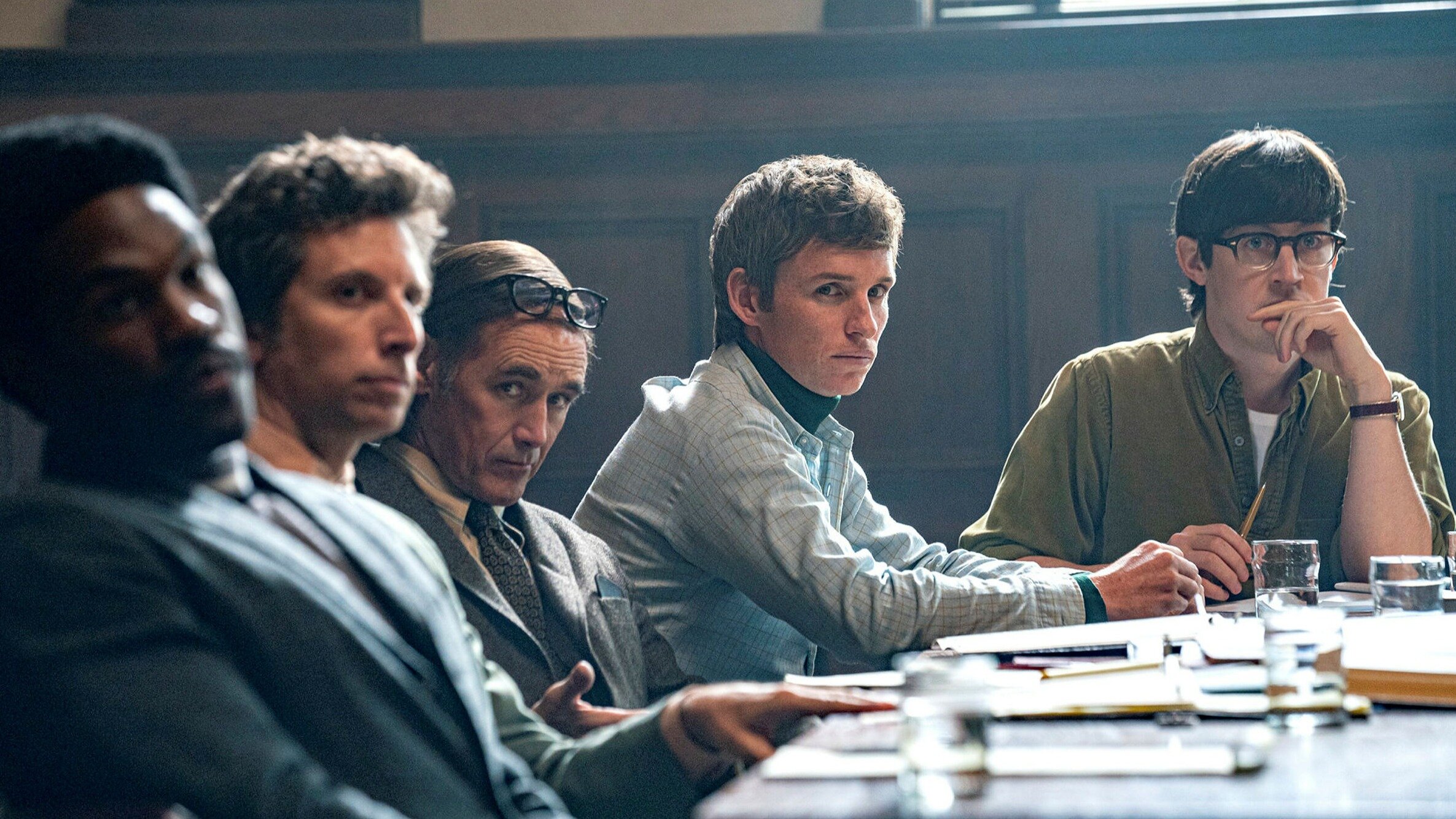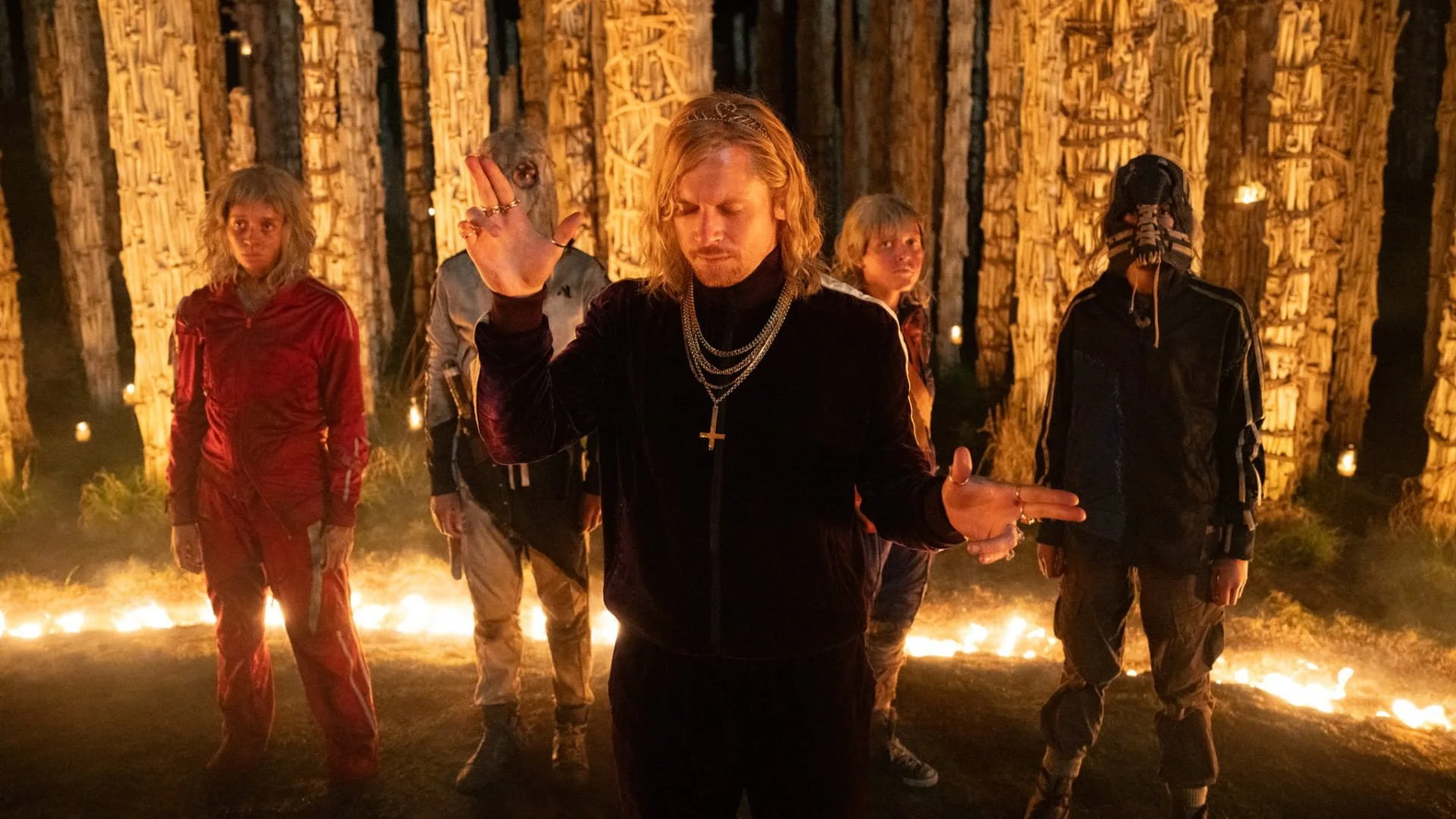Review: The Trial of the Chicago 7 (2020)
In the forward to the recently-published transcript of the actual “Trial of the Chicago 7,” Aaron Sorkin admits that when Steven Spielberg commissioned him to write a dramatic screenplay about the event, he was ignorant of the history. It seems that he never rectified that ignorance before writing and directing his screenplay of the trial. The resulting film, The Trial of the Chicago 7, with its big name cast, snappy dialogue, and patriotic showdowns within a Chicago courtroom, is patented Sorkin. It’s also historically absurd and reductionist. It takes a show trial about the absurdities of the American legal system and the injustice of the Vietnam War and boils it down to a demonstration of conflicted patriotic fervor, the sort of which Sorkin has been peddling his entire career.
It’s not a new criticism to say that Sorkin writes the same thing over and over again. Many writers are accused of doing so. But this criticism is hardly ever demonstrated so clearly as it is with The Trial of the Chicago 7. Sorkin seems to have only a cursory interest in the actual history and characters of the film. Again, it’s not new to say that Hollywood films are tenuous as historical documents—I’m not asking for a filmed transcript of the trial or else I’d read that instead of watching the film. But Sorkin takes the fascinating characters and history that informs the film and warps them to fit into his narrow character types and ideological worldview.
Ostensibly, the film explores the dynamics and conflicting progressive politics of the seven (originally eight) defendants in the show trial following the 1968 riots in Chicago at the Democratic National Convention: Youth International Party leaders Abbie Hoffman (Sacha Baron Cohen) and Jerry Rubin (Jeremy Strong), leaders of the Students for a Democratic Society, Tom Hayden (Eddie Redmayne) and Rennie Davis (Alex Sharp), pacifist David Dellinger (John Carroll Lynch), activists Lee Weiner (Noah Robbins) and John Froines (Daniel Flaherty), and National Chairman of the Black Panther Party, Bobby Seale (Yahya Abdul-Mateen II).
Thankfully, the film wastes no time setting up the characters or the conflict, introducing each character and their broadest motivations in an opening montage and then skipping right ahead to the trial, where we’ll learn about the events in Chicago through testimony and flashback. It’s a smart approach, showing that Sorkin still has command of good writing structure at least. Sorkin also sets up a strong antagonism between the defendants and their activist lawyer William Kunstler (Mark Rylance) on the one side and the vindictive, possibly-demented Judge Hoffman (Frank Langella) on the other. The opening moments with Judge Hoffman are hilarious, as he repeatedly messes up defendants’ names, bickers with Abbie Hoffman about their shared surname, and refuses Bobby Seale his legal rights for representation (Seale’s lawyer was in a coma at the time, but Hoffman refused to delay the trial or allow Seale to represent himself).
But the solid structure and humourous antagonism of the courtroom proves to be too little to distract from the cavalcade of absurdities on display. Again, I need to emphasize that I do not want a literal recreation of the trial on film; filmmakers can take their liberties with fact. But as the film progresses, the true thematic conflict at the heart of the film boils down to the political disagreements between Sorkin’s conceptions of Abbie Hoffman and Tom Hayden. Sorkin has each character represent the totality of radical progressivism and centrist reformism, respectively, and then has them butt heads over how to approach changing the system for the better.
But Sorkin doesn’t want to actually wrestle with the real ideological differences between the approaches; he flattens the men and their ideological beliefs and has them both unify into a blandly-liberal defense of American institutions. By the time Abbie Hoffman ends up on the stand and refers to the act of voting as a peaceful revolution, you know that Sorkin has no interest in the actual politics that led these men to riot in 1968. Baron Cohen does a great job at embodying the court jester aspect of Hoffman, capturing the intelligence beneath the prankster, but he cannot overcome the leaden quality of Sorkin’s speechifying, which Sorkin provides by rote at this point in his career.
Furthermore, the film displays little-to-no interest in any of the seven aside from Hoffman and Hayden. Lee Weiner and John Froines are literally sidelined in Sorkin’s actual camerawork—when their names are read by Judge Hoffman, Sorkin doesn’t even cut to a shot of them in the courtroom, so little is his interest in them. David Dellinger is reduced to a milksop who doesn’t believe in actual pacifism, swinging at a bailiff at one point (which didn’t happen in real life), as if a man who was arrested for refusing to serve in World War II would compromise his beliefs because a bailiff manhandled him.
Jerry Rubin is little more than a horny hippie dude and Rennie Davis’s character is summed up by his obsessive writing down the names of American casualties during the war. The list is something of a Chekhov’s Gun that Sorkin fires during the climax, with Hayden reading the names as a closing statement and a defiant act of anti-war protest. Of course, Sorkin doesn’t include the fact that Davis’s actual list had the names of the fallen Vietnamese as well, or that Hoffman and Rubin unveiled a North Vietnamese flag during the reading of the names, and almost certainly did not stand at attention in respect to fallen American troops. Sorkin thinks that everyone can rally around their respect for the troops and envisions the only credible anti-Vietnam War protests being about the death of American soldiers, when a cursory read of the history will show that protesters abhorred the killing of Vietnamese civilians and that many protestors on both sides of the political aisle had nothing but contempt for American troops.
And then there’s the film’s treatment of Bobby Seale. Yahya Abdul-Mateen II is savvy casting as the Black Panther leader; he’s physically impressive and carries himself with a dignity that is befitting the historical figure. But the film only uses him as a foil for the others. He is supposed to be there to remind us of the indignity of the court, of the injustice of the entire enterprise, showing how the judge cannot actually believe in justice if he denies basic rights to one of the defendants. But once he is literally bound and gagged in the courtroom for refusing to comply with the judge’s edicts, a mistrial is called for him and he disappears from the narrative, never to be referenced again. There is a great story to be told about Seale’s involvement in this trial and the racial scapegoating that was attempted by the American government, but this film is not that story.
In the end, Sorkin doesn’t give us an actual film about the Chicago 7. He gives us a film about his usual interests in the defense of American liberalism and the mythic virtue of American institutions. It is entertainingly acted and handsomely shot and occasionally witty and pointed, but it is never surprising and it is rarely true.
3 out of 10
The Trial of the Chicago 7 (2020, USA)
Written and directed by Aaron Sorkin; starring Sacha Baron Cohen, Eddie Redmayne, Yahya Abdul-Mateen II, Jeremy Strong, Mark Rylance, Joseph Gordon-Levitt, Michael Keaton, Frank Langella, John Carroll Lynch, Alex Sharpe, Noah Robbins, Daniel Flaherty, Ben Shenkman, Kelvin Harrison Jr.



This mockumentary starring Matt Johnson and Jay McCarrol is a complex metafiction farce and a loving portrait of friendship and Toronto.